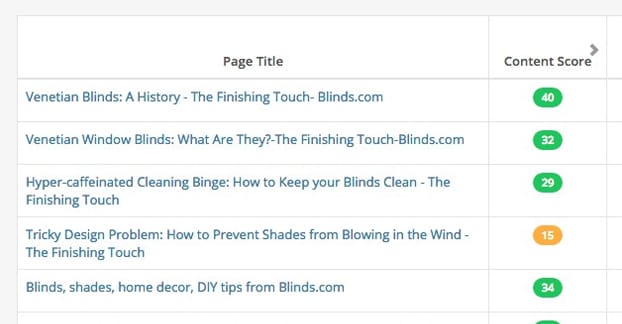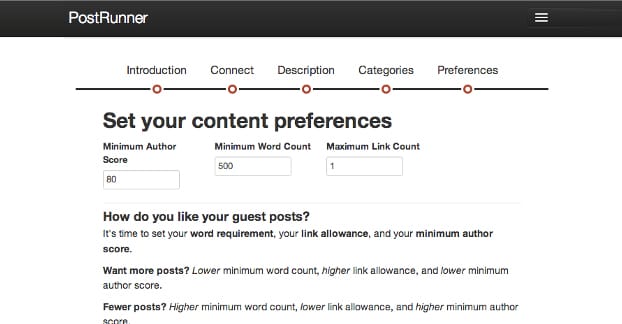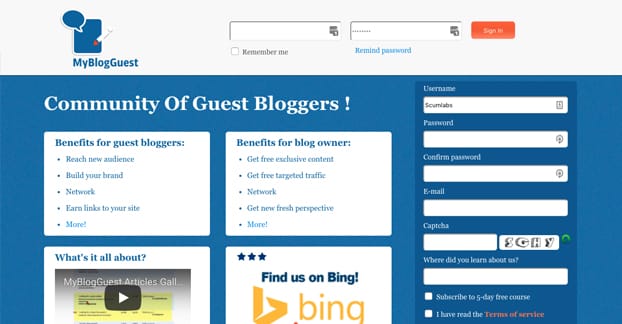Guest blogging is a pretty complex task. You need to do a lot of research to find sites that are both relevant to your niche and willing to accept content written by a third party. You need to figure out what kind of content they’re willing to accept, then write that kind of content. You need to get past negotiations with the editor to get that content accepted, which means writing some high quality content that fits with their site tone and perspective. All of that only happens once; you need to go through the whole process again for every new site, and often for the same sites over and over again. It takes a lot of effort to establish enough of a relationship that you don’t have to do at least part of that process every time.
So what if there was some kind of platform that would streamline the whole process? I’m imagining something where blogs sign up; those who are willing to produce content and those who are willing to publish content. Publishers get content from the platform and publish it, instantly giving the writers exposure and links without having to go through the full negotiation process every time.
The benefits of this kind of platform would be obvious. You don’t have to go out of your way to contact individual blogs to write for them, you can just write something and put it on the platform, knowing it’s likely to be published somewhere eventually. You get links and author credits all around the web without all the investment necessary to find those opportunities individually. Plus you could end up publishes on sites you wouldn’t have thought to check right away.
On the other hand, there are a lot of possible pitfalls. For one thing, I could set up a site right now and do nothing but accept posts from a network like that; my site wouldn’t be worth much, because the content is unfocused and I have no audience. Part of the guest posting research process is finding sites that are worth posting on, meaning they have an audience and they have the link juice to benefit your own site. For another thing, you probably have to pay a fee to get into such a network.
As a publisher, you would have to have a lot of controls over what kinds of content you publish. You want to have complete veto power, and you want to accept only high quality content that’s relevant to your site. If some sports blog suddenly publishes a random guest post about which model of front door is best for your house, it doesn’t make much sense and it doesn’t add any value. Google will discount it, and so will their readers.
Any such guest posting platform would also run the risk of being seen as a private blog network or reciprocal link scheme, or some other kind of “game the system” scheme that Google hates so much. The last thing you want is to find that suddenly every guest post you’ve written or published on your site is invalid because of your ties to a platform that was abused to game the search results. If you’re posting low quality articles on low quality sites, the end result will be comparable to the spam that these guys put out:
A guest posting platform would also need to have a balance between people willing to publish content and people willing to write content. If there are too many publishers and not enough writers, the publishers aren’t going to see anything worthwhile while they’re active, and will eventually let their accounts lapse. If there are too many writers, the publishers will have too few slots open and the competition will be too fierce. On either side of the coin, you will have trouble if you going on the wrong side. Only if you’re willing to both can you make a ton of use out of such a platform.
Of course, quality is important as well. You would need to make sure that the quality of the content floating around on the platform is up to par. You can’t afford to write bland content or publish terrible content on your own site; even if it’s easy to get published or find the content, it won’t be beneficial to use it in that scenario.
So, obviously, all of what I’m talking about already exists. This isn’t some hypothetical. Any time someone like me can come up with an idea like this for an industry as old as blogging, you can bet someone else has already come up with and monetized it. That’s just the nature of the internet.
Guest blogging platforms exist, but the question is, are they worth your time? Well, unfortunately, I can’t give you an unequivocal yes or no. You have to check them out yourself.
What Makes a Guest Post Network Viable?
So if I’m going to ask you to vet a site yourself, I should probably give you the criteria by which you can judge it, eh?
In order for a guest post network to be viable to use, it needs to meet several criteria. This depends on which side of the coin you’re going to be on.
If you’re looking to publish content you find on the site, you need to be able to vet that content for its quality. You need to be able to reject content that doesn’t fit your topic, your length requirements, or your link requirements. You need to be able to have complete control over anything published on your site, so if you sign up and they tell you that you have to publish content when it’s submitted, close the account. It’s not worth it.
If you’re looking to write content, you need to be able to see where that content is going to be published. You can’t just throw a piece of content into the void like you’re writing for a content mill; you need to be able to make sure that it’s not a spam site stealing your content or that they’re removing your link after the fact. Most importantly, you need to make sure the site is actually viable; if they’re a spam site, a site that has been deindexed, or a site with no audience, why would you want your content published on it?
On either side of the coin, you need to be careful if money is involved. If you have to pay a membership fee, either one-time or ongoing, it had better be worthwhile. The network is going to make money either way, so you need to be able to make the fee worthwhile. If you don’t see any noticeable returns for your investment, close out the account as soon as possible. You have better things you can spend your money on, for sure.
With all of that said, let’s take a look at the few options that exist.
PostRunner
PostRunner is a unique take on the guest posting network idea. Publishers add a WordPress plugin to their site that allows them to specify the kinds of content they are willing to publish. This allows you to set a minimum author score as determined by site ratings, a minimum word count, and a maximum link count. This is good, but they also recommend a minimum word count of 300, which is extremely short. Frankly, if you’re publishing 300-word guest posts on your site, you’re not listening to anything you read on this blog so you can just do whatever you want, I don’t care.
Authors can then create posts on whatever topic they want and submit it to the system. The posts are given to people who have the WordPress dashboard installed; those publishers can then review the post and determine if it matches their site well enough to publish. If the publisher likes the post, they can publish it, the post goes live and is removed from the running to prevent duplicate content online, and the deal is made.
Authors do get to choose the publishers, but publishers don’t get to pick or make requests from authors. That said, if the publisher likes the author, they can track them down outside the platform and pitch a deal directly. Publishers have veto power, at least, which is good.
As far as I can tell, PostRunner is free for publishers and costs money for authors. Authors are basically paying for the chance at promotion; it’s a monthly fee, so the cost per article depends on how many they can write, submit, and get accepted in a month. The one caveat is that plans depend on how many different sites the author wants to link to; a single blogger with a single site can pay $10 a month for unlimited submissions, but if they want to link to other sites, they have to bump up to the $25 per month plan for up to 5 different potential links. There is an unlimited plan, but it’s $195 per month, which is a little insane unless you’re a huge agency managing guest posts for a ton of smaller companies.
Is PostRunner worth the effort as a writer or a publisher? Again, I can’t tell you that. I haven’t used it; you’ll have to use it yourself. I would recommend signing up as a publisher and seeing what kind of content gets submitted; if it’s not very good, you can assume a lot about the quality of the network as a whole and probably drop it.
BlogDash
BlogDash is a blogger outreach platform, which means there’s no actual content flying around on the platform. Rather, it’s more like blogger profiles; they describe themselves as a LinkedIn for Bloggers sort of platform. Essentially, it’s a way to network with bloggers you know already are interested in the guest blogging exchange, or at least in media coverage.
In fact, BlogDash only works for guest blogging because of how blurred the lines are between a business and a blog at this point. The primary aim of the site is for businesses to sign up to find bloggers who will cover them in a “guest post” that’s more like a press release coverage. Bloggers sign up to find more content they can cover, though not really content they have written for them.
An alternative with more focus on bloggers rather than businesses is Blogger LinkUp. The downside to this, and the reason it’s not a subhead of its own, is that it’s not a very detailed site, it doesn’t have a very good design, and their SSL certificate doesn’t work. They also promote link parties, which can be seen as a black hat tactic if Google picks up on it.
Guestr
Another remnant of that era in business where everything had to end with a single r, Guestr is more like PostRunner, except it doesn’t have a plugin to integrate directly into your site. Blog owners can add their site to the database, and guest posters can find sites to approach with a guest post.
This site, too, isn’t exactly in a good position; code errors and a lack of recent listings makes me think it’s relatively dead. That could just be my experience with their homepage, so feel free to test it, but don’t say I didn’t warn you.
MyBlogGuest
MyBlogGuest is probably one of the biggest names and most active networks for guest post exchanges. Signing up to their network allows you to list your site and get people submitting guest posts to you, or it allows you to browse for sites you might want to send a post to. They’re free to use, but they monetize by having a premium article gallery for widespread exposure, as well as access to infographics and other more advanced kinds of content.
The downside to MyBlogGuest is that, well, at least once they have been penalized for being a private blog network. Google really doesn’t like them, so you have to be very careful in using them. It’s up to you if you’re willing to take that risk.
 ContentPowered.com
ContentPowered.com










